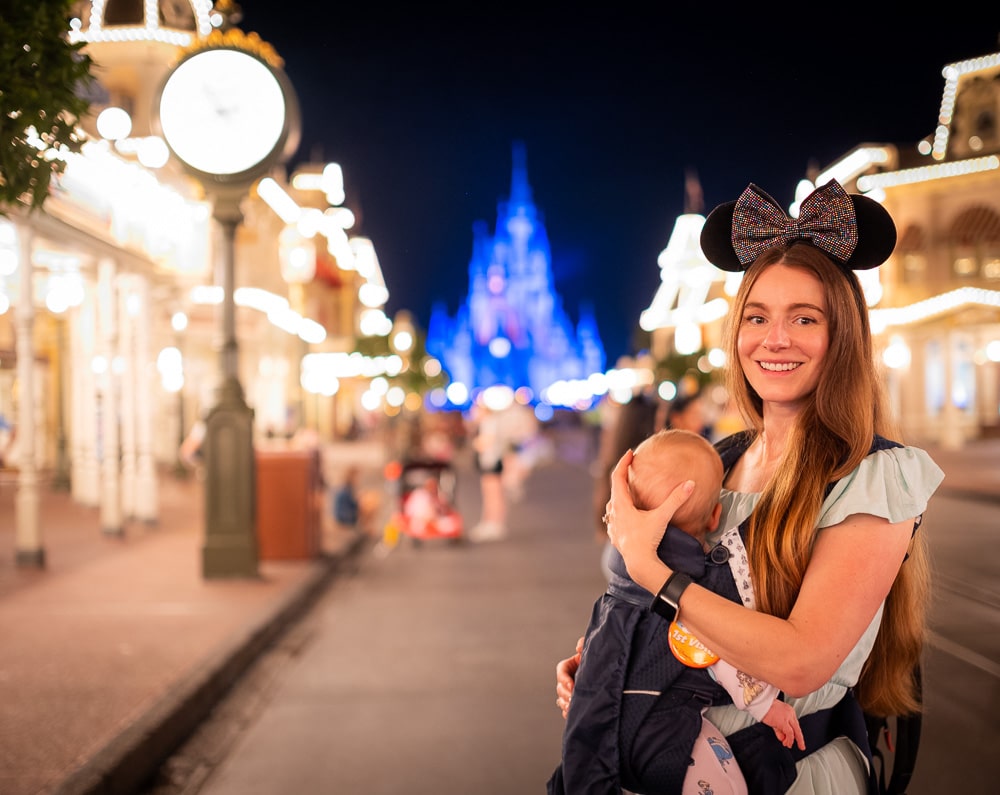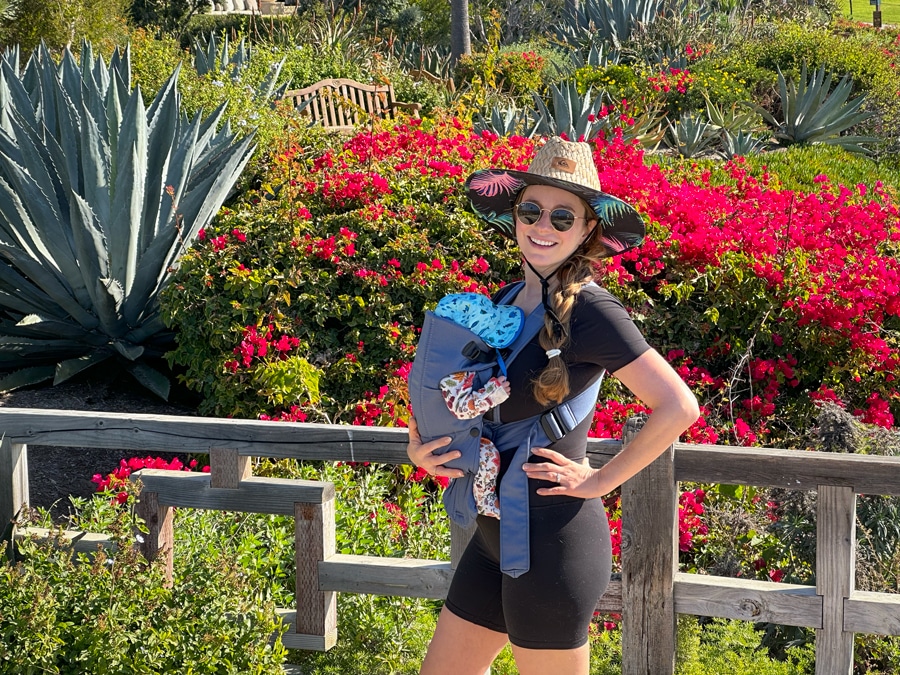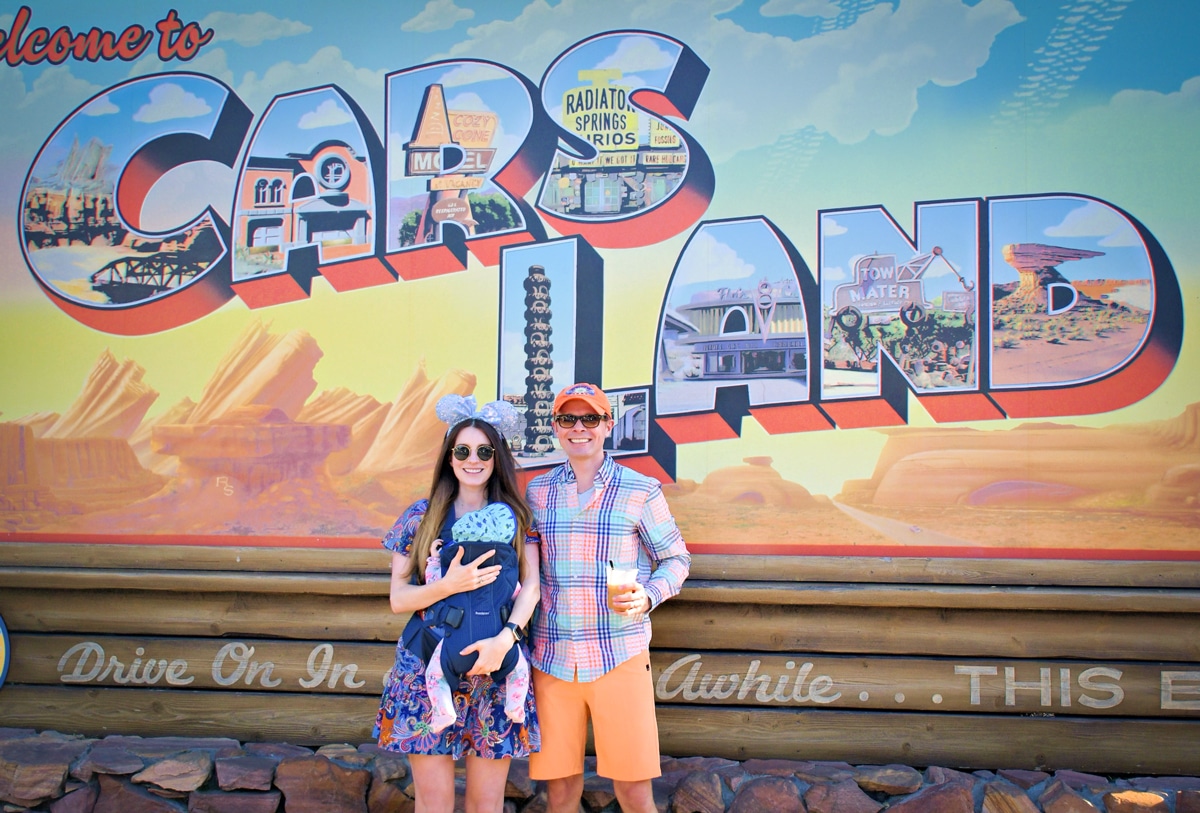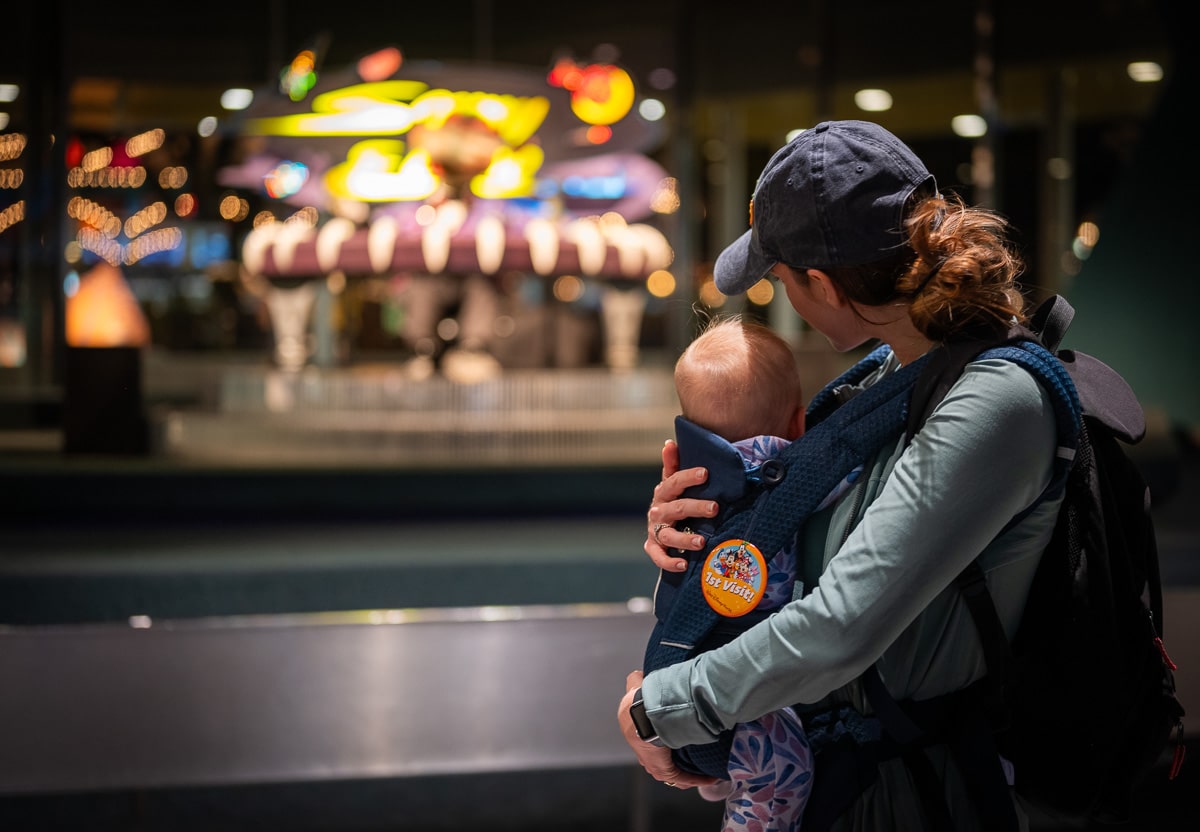
We’ve become big babywearing fans. Baby Bricker (Megatron) is worn on one of us in a baby carrier for multiple hours per day, and we’ve done dozens of Disney visits sans stroller–exclusively in a soft structured carrier (SSC). This guide to baby wearing covers everything we know so far, with tips & tricks, pros & cons, plus product recommendations.
Before we get going, I want to start with a few caveats. First, this guide is a work in progress. We do not purport to be babywearing experts after having our first child. That much is going to be obvious over the course of the post, but I just want to state as much up front. However, we already have traveled a ton in her first 9 months–and especially in the last few when we’ve been ‘on the road’ almost nonstop.
The reason we’re posting this now rather than waiting like 3 years to accumulate as much babywearing knowledge and experience as possible is because I’m worried we’re going to forget a lot of it. The months since Megatron’s arrival already feel a bit like a hazy dream, probably owing to their sleep-deprived nature.
Second, nothing here should be construed as a substitute for the advice of your doctors. This isn’t just a boilerplate CYA warning–like our plea to always order your steak medium rare (against the wishes of the CDC) or that no investment is better than lottery tickets (against the wishes of your CPA). If done improperly or with poor carriers, baby wearing actually pose real health risks.
You should talk to your pediatrician before baby wearing to discuss proper hip development and dysplasia, potential overheating, and so forth. All of that is beyond the scope of this post, except to the extent some of it is extremely relevant to Walt Disney World–just not the medical side of it.
Finally, we are babywearing enthusiasts. You all probably have that one friend who won’t shut up about how Bitcoin is the future or who does meticulous “research” into the royals or loves conspiracy theories. That’s us. Thankfully not with those specific topics, but we are babywearing maximalists. At least, that’ll be your impression in reading this if you’re “stroller people” who have never used a baby carrier before.
Within the babywearing community (which is a bit cult-ish), we’re actually “moderates.” Some babywearers extol the virtues of it, spurn strollers, and look down on those who don’t babywear. That is NOT us. We own a stroller and love it! We just prefer to babywear whenever and wherever possible.
Despite that, we haven’t sworn a blood oath to the babywearing cult–we recognize the downsides of babywearing and upsides of strollers (such as being a makeshift tripod–see the photo below). All of that is what we’ll try to present here, with a clear-eyed view of the good and bad of babywearing in general, and at Disney, specifically.


Let’s start with the reasons why we love babywearing while traveling to Disney and beyond. The first is that it’s much more convenient than using a stroller. Unlike a stroller, a baby carrier can go anywhere at Walt Disney World. This alone makes it more versatile than a stroller, which needs to be parked and left behind when you’re in lines, doing attractions, and more.
This was really the big one that sold us on babywearing. Until you’re in such a scenario, you don’t realize just how much of the world is inconvenient on wheels. This is something that stuck in my mind since we first did Walt Disney World with my dad in a wheelchair, and was equally apparent visiting Disneyland and other parks with friends who had kids in strollers.
There are so many places that are inaccessible, or inconvenient. Even little things that we took for granted, like the sidewalks and curbs on Main Street–or the trolley tracks!


This is pertinent in the parks for us, but probably more so in the real world. As compared to the most of the real world, Walt Disney World and Disneyland are really accessible. But we also spend a lot of time at the beach, hiking, and in urban environments.
We travel abroad and spend a lot of time in airports, on public transportation, and in cities that were designed hundreds of years ago. Even with just our carry-on suitcases, we’ve had hassles and headaches. We’ve seen people struggle with strollers in these places and knew we wanted to minimize that.
Using a stroller means fundamentally rethinking and reframing how you navigate public spaces. By contrast, a baby carrier changes nothing. You still walk around with your feet, same as always. Navigation remains a known quantity. For us, with so many other things changing, retaining a bit of the status quo was really important.


Along those lines, it’s much easier to navigate crowds while babywearing than it is when pushing a stroller. Before we had a baby, I would often “joke” that I’ve locked eyes with parents pushing double-wide strollers during the Magic Kingdom evening exodus after the fireworks and seen their utterly defeated-looking faces.
Except this isn’t a joke. I really have done this, and their expressions say one-thousand words. I cannot fathom trying to navigate a stroller through the gridlock in the Central Plaza in front of Sleeping Beauty or Cinderella Castles.
I literally would not do it. I would replan on visits with a mental congestion heatmap in my mind–just like we did with my dad and his wheelchair. I wouldn’t be comfortable with that level of congestion, worried that it could get downright unsafe for a small children in a stroller.


With babywearing, that’s no concern. While the examples above are mostly from Walt Disney World, this is actually an issue we routinely deal with at Disneyland, as the parades and fireworks both turn the park into a maze of narrow one-way routes. This wouldn’t worry me from a safety perspective in a stroller, but it’d be sub-optimal.
Another scenario where this comes up is at rope drop. I cannot imagine trying to navigate the Fantasyland bridge with a stroller. Not only that, but valuable time is wasted parking a stroller before jumping into line. (Every second counts!)
With a baby carrier, we’re able to move around like normal–before baby. This is really the big thing for us. We are avid walking enthusiasts, to the point that we are moving faster and with a greater sense of purpose than 95% of other guests even with a baby. Babywearing allows us to weave in and out of crowds with ease, passing slower guests comfortably and without inadvertently mowing down someone’s ankles or whatever.


The first big tip about babywearing at Disney is that you should do it before Disney. You know how it’s a bad idea to get a brand new pair of shoes and wear them at Walt Disney World for the first time? (If not, it’s a bad idea–unless you love blisters!) Same deal here.
We mention this because a trip to Disney is likely different than your day to day life. And I don’t just mean in the sense that there are gigantic rodents and you can ride a dachshund roller coaster. One of the biggest ‘rude awakenings’ people have when visiting Disney is the amount of walking involved. It’s practically inescapable. You almost assuredly will be logging 10,000 or more steps per day. Pre-baby, our average was 25,000.
Now imagine going from a few thousand steps per day to 10,000+ while also adding the weight of a watermelon. And not just any watermelon–one that also produces body heat and squirms around. You do not want to go from cold turkey to that. So it’s absolutely imperative that you integrate babywearing into your daily routine before doing Disney. And for that matter, it’s also a really good idea if you scale up the amount of physical activity in your daily routine–babywearing or not. That’s just good advice.


This is precisely why you’ve seen more photos of Sarah babywearing in our baby updates (that and because I’m the photographer in the family). While we both babywear for hours per day, Sarah is easily surpassing me. Not because I’m lazy or don’t enjoy it (I love it), but because Sarah wanted to build up her strength and endurance before we really start traveling and are babywearing for even longer timeframes.
I did not need to do this. Not to pretend I’m some tough guy with the strength of twenty mules (you can see photos of me–you know that’s not true), but I have extensive experience in a tangentially-related field: photography. Wearing a baby is like wearing a living camera bag. In our years of travel, I’ve carried a 20+ pound camera bag for days and weeks on end. Whatever muscles that builds up, I have them. (They must just be invisible!) I can babywear for hours on end, no problem.
Babywearing before Disney isn’t just for the sake of acclimating your body to it. You also need to do likewise for, you know, the baby. Some babies hate being worn. Some dislike certain carriers. Some run hot. Some will only nap in a certain environment. At least, all of this is our understanding based on words of warning we’ve received from family and friends


The first tip is the obvious: you need to find the right baby carrier for you. Again, we do not purport to be experts about babywearing or any child-centric topics, but we already have a decent amount of experience here along with some very strong opinions about the best baby carriers–or rather, our favorites.
Not to strain the photography comparison, but baby carriers are a lot like camera bags. Or perhaps shoes, for those of you who aren’t into photography. Safe to say that more of you have walking experience. As with camera bags or shoes, there are options that prioritize form and ones that prioritize function.
I beg of you, focus on a function-first baby carrier. Choosing one based on chicness or cuteness is the equivalent of wearing Louboutin heels to Disney or carrying your camera in a Birkin. Just a truly terrible idea. No one will be impressed by your flex–they’ll think you’re an impractical idiot.


I’ll also direct my ire at wrap or ring sling carriers. These suck. I’m sure some of you will vehemently disagree, and think that perhaps I’m a bit irrationally angry because I about lost it a couple times trying to contend with a fussy baby while wrapping the stupid thing around myself like a fool. You know what, I did. Those frustrations undoubtedly colored my opinion of the wraps.
But I also don’t like the wrap because they’re just not practical and cannot withstand the rigors of traveling or extended use. Perhaps these are perfectly fine for a quick trip to the grocery store or something of that nature. But they’re a nonstarter for multiple hours, much less multiple days at Disney.
My language is also forceful because we had a few friends effusively recommend the wrap carriers, and we spent $74 on what amounted to one long piece of fabric. I could’ve gone to the Arts & Crafts section at Walmart and bought the exact same thing (minus the fancy-brand tag) for $3.42 per yard. What did we even pay for?!?
I have a bunch of other grievances I’d like to air about the wrap baby carrier, but they’re beyond the scope of this post and are highly subjective, anyway. The salient point is that they simply are not robust or sufficiently supportive for Disney. You need a soft structured carrier. It’s a must for protecting baby’s developing hips and parents’ backs.


The next thing that’s imperative is a baby carrier designed for high heat and humid weather. It hopefully isn’t news to anyone that Florida gets hot, and summer lasts approximately 42 weeks per year.
At least for Walt Disney World, you need a baby carrier that’s breathable and has air flow. The good news is that many of the most popular brands have versions like this, so it’s not really a problem!
Beyond being better suited for the weather, breathable baby carriers are also easier to wash and faster to dry. I’m sure you can imagine some, ahem, scenarios where you might need to wash the baby carrier while traveling. Perhaps in your hotel room sink or even in a restroom in the parks.
Not that we have any experience or anything, but if we did, I’d tell you that the two carriers we recommend were dry in under an hour. (We also cleaned them via an actual washing machine in our Airbnb and hung them to dry overnight on several occasions so they didn’t smell like sweat.)


As an extension of this, I’d add that you want a baby carrier that isn’t cumbersome. (This is one way the wrap fans have the right idea, as that is just an ordinary piece of fabric that takes up almost no space in a backpack!) What we’ve found is that a lot of the baby carriers that aren’t made to be breathable have way too much thick fabric and other material. This makes them clunky to wear (as well as take on and off), and also hotter as a result.
Finally, don’t look for a baby carrier that does too much. This one is a matter of personal preference, and I could see others (reasonably) disagreeing. But I think it’s unwise to want a carrier with a bunch of pockets, bells and whistles, and so forth.
The goal should be having it be as supportive and comfortable as possible, while as light and low profile as possible. Once you start adding pockets and features, you’re adding unnecessary bulk–and that will be increasingly obvious once you’ve spent time using the carrier in the swamps.


We’ve used several specific carriers, so I’ll run through some of those that we’ve liked. Our first go-to carrier was the BabyBjörn Baby Carrier Mini.
This was great for about a month when Megatron was a newborn and didn’t seem quite ready, size-wise, for the regular carriers. The BabyBjörn Mini was comfortable, low-profile–checked almost all of the boxes above. We could still be using the BabyBjörn Mini right now–it’s good for up to 12 months of age and/or 24 pounds.
The problem for us was the lack of support. As baby started putting on the pounds, and we wore the carrier more frequently, it was more taxing on our backs. When we tested out the full size BabyBjörn, it felt like a revelation by comparison.
We don’t regret buying the BabyBjörn Mini as we got a ton of mileage out of it for that first month, and it now has a new home with Sarah’s sibling. However, we wouldn’t buy it again if we had to do it over again–and thus we cannot highly recommend it unless money is absolutely no issue. Other carriers are much better, so you won’t be using this for long.


Since then, we’ve used carriers by LÍLLÉbaby, Colugo, BabyBjörn and Ergobaby.
We actually got a little carried away and ordered two different LÍLLÉbaby models, as they were deeply discounted last year during Prime Day last year. Neither of us love the LÍLLÉbaby or Colugo carriers for the exact same reason: they’re too clunky and cumbersome. There’s nothing necessarily wrong with them and they’d be great for colder climates or exclusively indoors, but this is a post about babywearing at Disney.
Even the LÍLLÉbaby Complete Airflow, which is the most breathable and best option from that brand, still suffers from this problem. That’s my third-favorite carrier, for whatever that’s worth, but it’s a distant third place behind the top two models. (It’s also the cheapest and is currently 40% off for Prime Day.)


There is no consensus between the two of us as to the best baby carrier for Disney. The good news is that both of our favorites are excellent, just with different pros & cons–which can be a good thing for extensive babywearing.
Sarah prefers the BabyBjörn Baby Carrier One Air with 3D Mesh. The lightweight, breathable 3D mesh fabric keeps both baby and parent cool, even outside on hot days. The combination of comfortable padded straps and supports along with ergonomic design makes the BabyBjörn Baby Carrier One Air perfect for extended periods of use. Weight distribution meant no soreness or back pain even after carrying a 20+ pound baby on all-day outings for over 20,000 steps.
The front top clips on the BabyBjörn Baby Carrier One Air also make it easy for one person to use. Same goes for quickly taking baby in and out, which we do often. Also relevant for our purposes is that this is the easiest carrier for transitioning a sleeping baby from carrier to crib without disruption.


It’s pretty much the same story with the Ergobaby Omni Breeze. Pretty much all of the points about comfort and support from the above also apply here, so I’m not going to repeat the exact same paragraphs.
The first added upside of the Ergobaby Omni Breeze is that it’s even more breathable. The manufacturer advertises it as offering 33% more air flow than the leading competitor, which I assume is the BabyBjörn Baby Carrier One Air. Usually stuff like this is fluff, but I think it’s true here. The Ergobaby Omni Breeze is just a bit thinner and has a few quality of life improvements.
As someone who ‘runs hot,’ this is huge for me. Both are considerably cooler than all of the competition, but the Ergobaby has a clear edge. (Because it was on sale, we ordered a dark blue version. With the benefit of hindsight, I’d get one of the lighter colors because it’ll be even cooler.)


I also like that the Ergobaby Omni Breeze has a built-in hood for sun protection. This doesn’t matter to Sarah because she carries an umbrella, but I do not. That means we either need a hood like this or a sun hat directly on Megatron’s head. The former option is superior in hotter weather, as it allows baby to better regulate her body temperature and expel heat out of her head.
There are other little bells and whistles of the Ergobaby like a phone pouch, and some of these are nice touches–but none really move the needle for me. The biggest downside of the Ergobaby Omni Breeze is that taking Megatron in and out isn’t nearly as easy–and we definitely cannot do it without waking her up.
It’s also worth pointing out that Sarah finds the BabyBjörn Baby Carrier One Air to be more comfortable, whereas I prefer the Ergobaby Omni Breeze. It’s a close call for both of us, and we travel with both because the weight falls slightly differently, which makes switching them up ideal.
You might find one or the other more comfortable–or a completely different carrier. (Accordingly, we’d recommend ordering from somewhere with a liberal return policy.) Again, same idea as with shoes–and also like those, there’s probably going to be a carrier you favor and use more often.


One thing we noticed during our extended stay in Japan (during which we used our baby carriers every single day and left our stroller behind in Tokyo for a few weeks) is that these two carriers are far and away the most common. I would hazard a guess that at least 75% of the carriers we saw were one of these two models.
I mention this not to validate our opinions (that’s just a happy bonus), but because Japanese parents probably have similar priorities as Disney travelers. Japan–at least where we were–gets hot. Parents are often of smaller stature, so weight distribution and comfort matters a lot. Babywearing is also much more common in Japan, likely because navigating public transportation and city streets with a stroller is suboptimal.
One other model we saw with some degree of frequency (perhaps 15% of the time?) was the Nuna CUDL Clik. I kind of wanted to buy this when we got home, but was informed that we’ve already bought “too many” baby carriers. (Not to mention, this one costs $250!)


Either the Ergobaby Omni Breeze or the BabyBjörn Baby Carrier One Air is perfectly suited for all-day, every day use during your Walt Disney World vacation. You could completely leave the stroller behind and travel only with one of these two carriers. However, we would not recommend a carrier-only approach to the parks and do not embrace one ourselves.
One reason why is weather. As mentioned above, Summer lasts approximately 42 weeks per year in Florida, and it can be very hot and humid pretty much anytime between April and November.
While babywearing is perfectly safe in all climates, it is not necessarily comfortable. Unless you live somewhere with similar weather (and hopefully you do not), it’s impossible to predict how parent and baby will adapt to babywearing in the Florida weather.


We were perfectly fine during days at Walt Disney World in April and May, but not June. Outside of the early morning and after the sun went down, babywearing during Florida’s summer months was a complete non-starter for us. Again, probably perfectly safe–but not even remotely comfortable.
Just being outside at Walt Disney World during triple digit “feels like” temperatures is already fairly unpleasant. Now attach what’s basically a 20-pound heater to your chest. It makes that feeling worse, certainly not better. (See Biggest Lesson We Learned from Baby Bricker’s Summer Trip to Walt Disney World for more on the pitfalls of visiting during the hottest season(s) of the year.)
Disneyland is much more conducive to babywearing most of the year (although summer heat waves do happen), but you’ll probably want to mix a carrier with a stroller at Walt Disney World and every single international park during the height of the summer heat and humidity.


There are plenty of other reasons to have a stroller even when the weather is perfectly fine. An obvious one is to give your back a break, as even the most comfortable carriers can be less so after 12 consecutive hours of wear for multiple days in a row.
One huge selling point for us is that a stroller is basically a free locker. We’ve “joked” to one another that we wish we thought of this hack before we had a baby. If it weren’t for the awkwardness of taking a baby-less stroller through security, we would recommend it to non-parents.
Seriously, the stroller-as-a-free-locker is a game-changer. It’s even better than a paid locker, as you can put it where you want it and move it around. But the purpose of this post is not to extol the virtues of strollers at Walt Disney World. We’ll have another article of that flavor once we have more stroller time under our belts (and we’re quickly gaining it thanks to the worsening weather!).


Instead, our angle is to “sell” you on babywearing even if you’re stroller people.
The biggest reason to supplement strollers with carriers is because, as noted above, carriers can go anywhere that you can. Whereas you have to park strollers outside most attractions, you can bring your baby into queues and on many rides while being worn in a carrier.
This alone is huge. Holding a squirming baby while waiting 45 minutes for Peter Pan’s Flight is not a pleasant experience. It’s also not easy, as your arms will likely get tired. Now repeat that process over and over again for every attraction with long lines. By contrast, a baby in a carrier can stay in that, often even on the ride itself.


Baby wearing also gives you the freedom of ditching your stroller for hours on end. Remember the example of fighting fireworks crowds with a stroller? Why not instead park it in Tomorrowland before staking out a spot, babywearing during Happily Ever After, then heading back for a spin on the TTA PeopleMover before retrieving your stroller!
This also applies to so many other circumstances involving congestion. Gift shops, restaurants–even rope drop. I know some parents fear leaving their stroller behind due to theft or having it relocated. We do not. We just drop an Air Tag in that bad boy and park it with all of our belongings (minus my camera bag) for hours on end. While stroller theft does happen, that’s true of anything. We still park our car and leave our home unattended.
Just be careful not to accidentally leave your stroller behind after leaving the park at the end of the night…not that we speak from experience or anything. Oops.


Another reason to baby wear is for naps.
Every baby is different when it comes to sleeping scenarios, but I’d hazard a guess that most will likely sleep better in a carrier–if properly acclimated to it–than a stroller. Although I’m completely making this up, it strikes me as one of those “it’s just science” types of things. Babies being pressed close to their parents’ chests is natural and comforting or whatever.
Not only that, but again, baby carriers can go anywhere. If the sleeping baby is in a stroller, that’s presumably going to be their naptime setting until they wake up. Meaning you can’t get in queues or ditch the stroller. Advantage: babywearing.


We think one really underrated aspect of babywearing is seeing Walt Disney World–or the world for that matter–through the eyes of your child.
Although all of these photos feature Megatron in the inward facing position that’s simply for her privacy. We actually have her facing out more often than not now that she’s bigger. This gives her essentially the same view of things that we have, and we love being able to see her react to her environment, free roaming characters, etc.
It just isn’t the same with a stroller for us or for her. In our view, there’s a greater disconnect and it’s less enjoyable. We can’t tell what, if anything, she’s looking at–and often she can’t see anything but legs as the stroller shade cover limits her field of view. To each their own on this, but we find babywearing to be so much more satisfying from this perspective.
Outward babywearing is also much more conducive to family photos and spontaneous selfies. We find ourselves taking so many more photos while wearing her than when she’s in a stroller. Getting her out of the stroller is more of a hassle, and we often find ourselves not wanting to disturb her. We either don’t take the photo or it’s of us and the stroller instead of us as a family.


Ultimately, there is no one-size-fits-all answer to any of this. Not the battle of baby wearing vs. strollers at Walt Disney World, nor which carrier is best for the parks. But like many debates, there is a middle ground compromise that will work out well for many people. In our view, that is buying a breathable baby carrier and using that to supplement your stroller–or vice-versa.
From an objective perspective, I think this is the “correct” approach to doing Disney with infants. It gives you the most flexibility and versatility, with most of the upsides of strollers and babywearing while minimizing the downsides. This “best of both worlds” approach is a great way to do not just Walt Disney World or Disneyland…but pretty much anywhere!
Planning a Walt Disney World trip? Learn about hotels on our Walt Disney World Hotels Reviews page. For where to eat, read our Walt Disney World Restaurant Reviews. To save money on tickets or determine which type to buy, read our Tips for Saving Money on Walt Disney World Tickets post. Our What to Pack for Disney Trips post takes a unique look at clever items to take. For what to do and when to do it, our Walt Disney World Ride Guides will help. For comprehensive advice, the best place to start is our Walt Disney World Trip Planning Guide for everything you need to know!
YOUR THOUGHTS
What do you think about babywearing at Walt Disney World? Is it worth doing or should you simply stick to strollers? Does visiting in summer vs. winter change the equation for you? Which baby carriers would you recommend? Do you agree or disagree with our assessment? Any questions we can help you answer? Hearing your feedback—even when you disagree with us—is both interesting to us and helpful to other readers, so please share your thoughts below in the comments!












